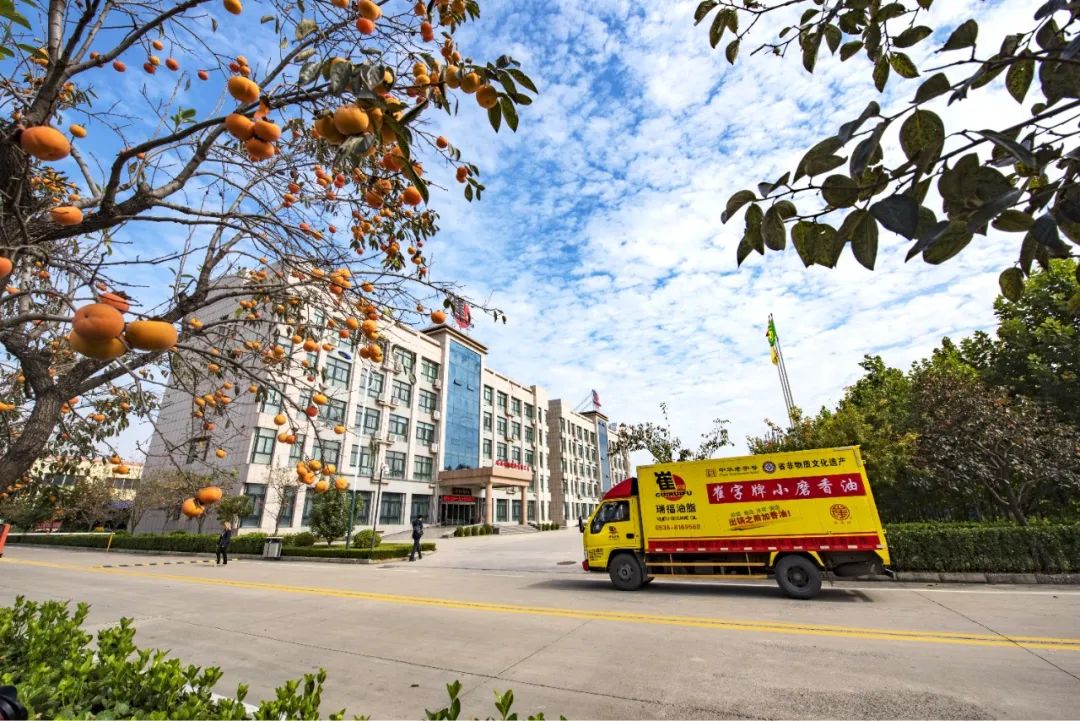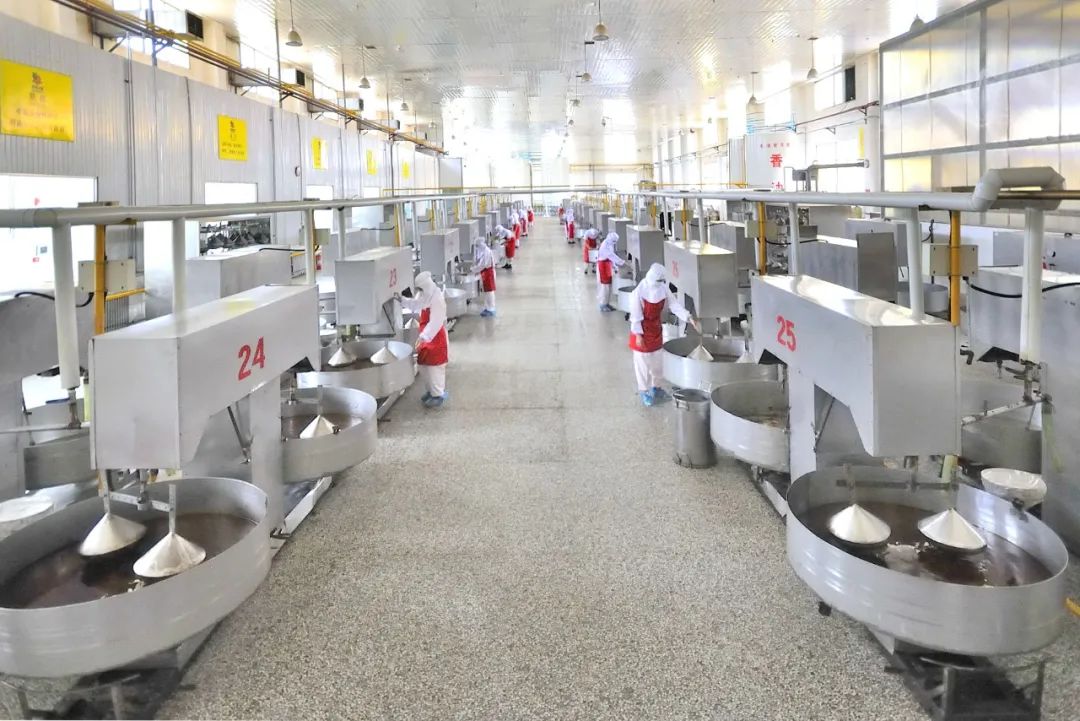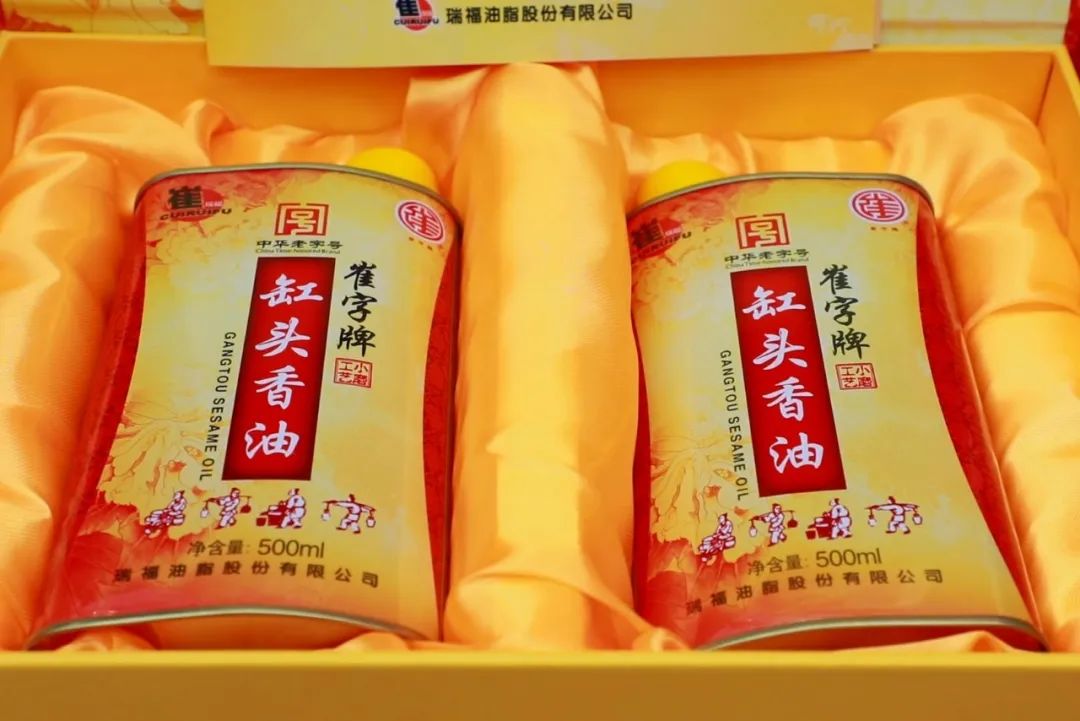Leading Enterprise in Strengthening Agriculture and Rural Areas | Ruifu Edible Oil Co., Ltd.: Small Grinding Sesame Oil "Turns" the World
Release time:
2025-07-22 09:36
Source:
Weifang Three Rural Affairs Official Account
Rui Fu Oil and Fat Chairman Cui Ruifu put forward the goals of "Quality creates market, integrity creates future", "Walk the right path, walk the grand path", and "Eat only one bowl of rice in a lifetime, do only one thing in a hundred years." This proves that: 600 years of skill inheritance and innovation have ensured that traditional agriculture is no longer a museum specimen, but a vibrant civilization that can be revitalized through technological innovation, cultural empowerment, and a global perspective. It makes rural revitalization not simply a blood transfusion to alleviate poverty, but the construction of a value symbiosis from field to table.

In the southern hilly area of Weifang, Shandong, in the autumn fields, golden waves roll, and heavy sesame pods begin to mature and burst under the sun, small seeds rolling on the land, and a faint special fragrance permeating the air. This fragrance has traversed millennia: the character "ma" (hemp) in the oracle bone inscriptions of the Yin Shang dynasty, the hu ma (sesame) seeds brought back by Zhang Qian of the Han Dynasty, the record of "sesame oil is superior" in the Qimin Yaoshu, and the cries of "sesame paste chicken skin" in the streets of Tokyo Bianliang in the Song Dynasty... A single sesame seed carries the Chinese people's ultimate pursuit of fragrance. At Ruifu Oil and Fat Co., Ltd., the ancient sesame fragrance is being reborn in a new form. On the modern production line, more than 100 stone mills rotate at a uniform speed, and amber-colored sesame paste slowly flows from the mill slits; in the laboratory, researchers use gas-liquid chromatography to analyze fragrance molecules; in the market, small mill sesame oil with the "Cui" brand is placed on the shelves of European and American supermarkets... In the collision of tradition and modernity, the industrial history of a "Chinese time-honored brand" is unfolding like a poem.
Stone Mill Spring and Autumn: Guardian of 600 Years of Skill
1.1 The Past and Present of "Cui" Brand Sesame Oil
"Cui" brand small mill sesame oil is a leading brand in the sesame oil industry, already famous throughout the country and renowned worldwide, with production and sales volume ranking first in the world. Just like the proverb "Sesame blossoms, growing higher and higher" implies, "Cui" brand small mill sesame oil, from a tiny sesame seed, has grown into a towering pillar that has weathered the storms of six hundred years of spring and autumn.
The inventor of "Cui" brand small mill sesame oil, Cui Zeshi, was born in Shanxi in 1348. As a first-generation immigrant during the Hongwu reign of the Ming Dynasty, he came to Weixian County from Hongdong County. Cui Zeshi was the second son in his family, also known as "Cui Laoer" (Old Second Cui), the ancestor of Cui's small mill sesame oil, and the ancestor of sesame oil. Before him, people only ate sesame seeds and sesame paste, which was made by pounding sesame seeds with a stone mortar.
One day in 1408, while having lunch, Cui Zeshi wanted to add some hot water to the sesame paste in his bowl and add it to his dish. He accidentally added too much hot water. When he stirred it with chopsticks, he found many oil droplets floating in the bowl. He gently shook the bowl and found that the oil droplets gathered together. A special fragrance filled the air. So, the talented and clever Cui Zeshi tried to stir-fry sesame seeds in an iron pan, use his own small stone mill to grind the sesame paste, and try to make sesame oil using the "water substitution method." Over time, he developed a complete process, which has been used to this day, just as his name implies: to benefit future generations and the world.
In the interview, I discovered a mysterious and coincidental phenomenon. From its invention to the present day, "Cui" brand small mill sesame oil has been passed down for 600 years, and by the generation of Cui Ruifu, there have been 20 generations of inheritors, all of whom happened to be the second son in their families, so it is also called "Cui Laoer sesame oil".
"Cui" brand small mill sesame oil truly became famous starting with Cui Ruifu's grandfather, Cui Shengyang, the eighteenth-generation inheritor of "Cui" brand sesame oil. In 1932, Cui Shengyang opened a shop called "Cui Ji Sesame Oil Workshop" in Weixian City and began independently producing and selling sesame oil and sesame paste. With the business philosophy of "being kind to people and operating with integrity," he set four rules for himself—"materials must be superior, water must be good, utensils must be clean, and scales must be accurate."
During the 1960s and 1970s, a special historical period put Cui Shengyang's business on hold for a long time. However, he never gave up his love and research of sesame oil craftsmanship, using this time to continuously improve his skills and laying a solid foundation for the future revival of his family business. When the historical haze dissipated, Cui Shengyang, relying on his profound skills in sesame oil making and keen market insight, reopened the doors of "Cui Ji Sesame Oil Workshop." In 1983, the spring breeze of reform and opening up swept across the motherland. Mr. Cui Shengyang, who was over eighty years old, went to the Administration for Industry and Commerce to register a business license with a capital of 60 yuan, continuing to practice his philosophy of "superior materials, good water, clean utensils, and accurate scales." From then on, he laid a solid foundation for this family's oil and fat enterprise.
The current chairman, Cui Ruifu, was 24 years old at the time. He started riding a bicycle with oil cans tied to the back seat, going from street to street to help his father sell sesame oil. Unfortunately, in 1985, two years later, Mr. Cui Shengyang passed away. His second son, Cui Xinshan, Cui Ruifu's father, founded the "Yuhe Township Cuijiazhuang Sesame Oil Processing Factory" in 1984. He put forward the business philosophy of "relying on character to be a person, relying on friends to do things, and relying on quality for products," and set the goal of "creating high-quality products and export products," a goal that his son Cui Ruifu later achieved.
The true expansion and strengthening, becoming the world's largest brand, was achieved by Mr. Cui Ruifu, the twentieth-generation inheritor of "Cui" brand small mill sesame oil. He not only expanded the enterprise but also carried forward the corporate culture of sesame oil. He put forward the goals of "Quality creates market, integrity creates future", "Walk the right path, walk the grand path", and "Eat only one bowl of rice in a lifetime, do only one thing in a hundred years"; he also proposed that "the best marketing is sincerity, and the best service is the product." With Mr. Cui Ruifu's correct business philosophy, "Cui" brand small mill sesame oil uses "zero defects, thoroughness in everything" as its quality standard, grasping quality from the source, implementing a "seed + base + farmer" workshop management model, and carrying out quality control over the entire industrial chain. In terms of small mill sesame oil craftsmanship, it retains the four classic processes of sesame germination, stone mill grinding, water substitution oil extraction, and physical purification. Adhering to low temperature and low pressure, it maximizes the retention of nutritional components such as sesamol, sesamin, and sesamolin in sesame.
He not only restored the traditional sesame oil making process, but also combined it with the needs of the times, innovating and improving the product, making "Cui Zi Brand" small-grinding sesame oil gradually emerge in the local and even national markets, becoming a well-loved time-honored brand.
From its humble beginnings to becoming a world leader in the industry, "Cui Zi Brand" small-grinding sesame oil boasts an annual output value exceeding 600 million yuan. Its fragrance has spread far and wide, earning worldwide acclaim. The transformation from 60 yuan to 600 million yuan represents the countless hardships and efforts of three generations of the Cui family, culminating in their success as the "king of sesame oil."
1.2 The Scientific Code of the Water-Substitution Method
Cui Ruifu standardized the ancestral "stone mill water-substitution method": the sesame must be sun-ripened, with an oil content exceeding 52%; the iron wok temperature during roasting must be precisely 215℃, one degree more will result in bitterness, one degree less will result in rawness; the stone mill must be made of Taihang Mountain bluestone, rotating no more than 30 revolutions per minute... Workers jokingly call him a "sesame maniac," but he says, "Sesame oil is a "living cultural relic" left to us by our ancestors, and we must protect it with our lives." He has always adhered to long-termism, building a century-old enterprise, avoiding short-term gains; he has always upheld the principles of "making products is making character, making food is making conscience," and "a company that is good to its customers is a good company, and a boss who is good to his employees is a good boss"; he has always believed that "doing small things well is a great thing."
In the workshop of Ruifu Oil Co., Ltd., the water-substitution oil extraction method is a delicate physical magic show. Sesame is ground into paste and poured into a specially made oil-shaking pot. The copper pot in the oil pot shakes at a uniform speed, water is added, and the oil pot is stirred at a specific frequency. Water molecules and oil molecules separate during movement, and sesame oil floats to the surface like gold thread. This technique is listed as an intangible cultural heritage of Shandong Province, but few people know that the engineers of Ruifu Oil have used fluid mechanics to deconstruct traditional experience: stirring force corresponds to shear rate, water temperature affects interfacial tension, and finally establishes a mathematical model, transforming the millennial craft into quantifiable industrial parameters.
1.3 Craftsmanship: Quality and Safety
Entering Weifang Ruifu Oil Co., Ltd., the first thing that catches the eye is the three flags fluttering high on the stainless steel flagpole in front of the office building: one is the company flag with their logo, the middle is the bright red national flag, and the other is the universally recognized safety flag. This shows Mr. Cui Ruifu's love for the factory, patriotism, and the concept of safety first. All production workshops and warehouses, as long as they are in production, are not allowed to close the doors to prevent fire and other safety accidents, so that personnel can escape immediately. In front of the building are two works of art made from old stone mills, one engraved with "The people regard food as their heaven," and the other with "Food safety comes first." Every person entering the office building will first see these two sentences, showing Ruifu Oil Company's emphasis on food safety.
Due to the superior quality and reasonable price of the products, the demand in South Korea and Japan is very high. Mr. Cui Ruifu said: "I really don't want to sell them to them, such good things should be enjoyed by our people first." In the well-organized production area, the greenery is as beautiful as a park. However, a piece of land of several tens of mu is intentionally left to grow green and environmentally friendly pollution-free vegetables, and the restaurant's dishes allow workers to eat with peace of mind. The vegetables that the factory cannot use can also be distributed to the workers, allowing them to take the fresh vegetables home to their families.
Under the guidance of the staff, I took the elevator to the reception room on the third floor of the office building. This reception room is simply a hall of fame. The room is full of certificates and signs of honor, making the large reception room look dazzling and full of treasures. The "Time-honored Chinese Brand" first announced by the Ministry of Commerce of China, the "Top 100 Enterprises" in China's food industry, the "Tax Credit Enterprise" of Shandong Province, the "Contract-Honoring and Credit-Keeping Enterprise" of the State Administration for Market Regulation, the "China Famous Trademark"... Hundreds of square meters of reception room three walls, full of honors.
These honors are not only a recognition of the quality of Cui Zi Brand sesame oil, but also the best interpretation of Mr. Cui Ruifu and his team's craftsmanship. Behind each plaque of honor lies their dedication to product quality and strict control of safety production. Here, every drop of sesame oil carries the hard work and sweat of the craftsmen, and every process has been carefully designed and rigorously tested. It is this adherence to the spirit of craftsmanship that has enabled Cui Zi Brand sesame oil to stand out in the fierce market competition and win widespread praise from consumers at home and abroad.
1.4 Doing Small Things Well
"Doing small things well" is the motto of Chairman Cui Ruifu.
Sesame seeds are insignificant in our lives. There is a proverb that says, "Sesame seeds on a scale - insignificant." There is also a saying, "Picking up sesame seeds and missing winter melons." In ancient times, a humble official position was called "a seventh-rank sesame official." Sesame oil is not a necessity like rice and flour, it is optional and cannot be consumed in large quantities at once, only a few drops are used when making cold dishes, soups, and stir-fries. A common saying among the people is: "You're like dripping sesame oil," which also reflects the preciousness of sesame oil. But it is this inconspicuous drop of sesame oil in life that Cui Ruifu has turned into a world-renowned industry.
"Doing small things well," I believe this phrase is not only a pun, but also has a deeper meaning for Cui Ruifu. In his office, I raised this question directly, and Cui Ruifu spoke eloquently, making the following statement: In our daily work and life, we cannot ignore the details, details determine success or failure; small people can still cause big events, the fuse of the first two world wars were all caused by small people. Any big event is the accumulation of small things. If you can't do small things well, how can you talk about great things? Whether it is a product or a service, the handling of details directly determines its quality. Secondly, details affect efficiency, a small oversight may lead to the collapse of the entire system. Sometimes, in negotiations, an expression, a look, a word can affect the final result. Attaching importance to details is not only an attitude, but also an ability. Only by paying attention to details can we remain invincible in competition. Another is the issue of focus, like Ruifu Oil's business philosophy: "Eat only one bowl of rice in a lifetime, do only one thing in a hundred years." Professionals do professional things, only when you specialize and refine, can you do things well. Now the country encourages the creation of "specialized, refined, distinctive, and new" enterprises, which is actually encouraging entrepreneurs to do and refine their own things. Years of experience have taught us that those who are greedy for size and quantity, and want to do everything, end up doing nothing.

Industrial Transformation: From Workshop to Global Supply Chain
2.1 A Grand Scene in the Sesame Empire
Ruifu Oil's raw material storage area houses four large warehouses dedicated to storing newly purchased fresh sesame seeds. The sesame seeds are piled high, with each warehouse storing 4,000 tons. I asked the accompanying manager, Chen Xinghai, "Do you purchase your annual usage all at once during the harvest season?" He smiled and said, "That would lead to stale sesame seeds! We cycle through our stock every three months at most. Each batch undergoes a germination test; sesame seeds that don't germinate are rejected. We only use live sesame seeds, never dead ones. This is because experiments have shown that fresh sesame seeds contain significantly higher levels of sesamol, sesamin, and sesamolin, which are beneficial for delaying aging, protecting the liver, and lowering blood pressure and cholesterol. Therefore, we absolutely do not use a single dead sesame seed!" Manager Chen Xinghai explained, "Our planting bases are spread across the globe. Sesame seeds grown in Africa are also of excellent quality, accounting for over 40% of our annual consumption, with the remaining 60% sourced domestically. Because sesame is a low-yield crop, with a yield of about 100 kilograms per mu, many areas cannot be harvested mechanically and rely on manual threshing, making large-scale planting difficult."
In the fifth-floor screening room, a staff member showed us a screen displaying: In an Ethiopian sesame planting base, Ayesha, a dark-skinned woman, bends to harvest. She doesn't know that these sesame seeds will cross the Indian Ocean and eventually become sesame oil and tahini in supermarkets in China and around the world. This is just one region in Ruifu Oil's globally built raw material network.
African sesame seeds are plump, Central Asian sesame seeds are fragrant, and domestic sesame seeds are brightly colored. By establishing 200,000 mu of planting bases and implementing the "enterprise + cooperative + farmer" model, they have tripled the annual income of Ma, an impoverished household in Jimusar County, Xinjiang: "Before, sesame seeds didn't fetch a good price. Now Ruifu buys them all and teaches us organic farming."
2.2 Industrial Revolution in the Workshop
After the germination test, the sesame seeds are cleaned and inspected to prevent any damaged seeds from entering the production process. The selected sesame seeds are then sent to a 1,000-square-meter roasting workshop. This workshop is equipped with four large intelligent seed roasters. These four modern seed roasters precisely control temperature and heat, ensuring that each roasted sesame seed is consistent, significantly improving the oil yield and quality of the sesame oil. After roasting and cooling, the sesame seeds are evenly distributed to the hoppers above the millstones by advanced equipment, and then evenly distributed to each millstone. These large millstones, driven by mechanical power, continuously rotate and grind, becoming increasingly fragrant, filling the air with a rich sesame aroma.
In the 1,500-square-meter milling workshop, we saw 10 automatic feeding hoppers, with over 100 millstones inside, operating continuously like perpetual motion machines, creating a magnificent and spectacular scene. They are installed in a temperature- and humidity-controlled workshop, with the millstones connected to pressure sensors, and the grinding fineness is uploaded to the cloud in real time. The coexistence of tradition and modernity is evident here, with machines responsible for "intelligence" and "standardization," while the millstones retain the "soul" of traditional craftsmanship.
Initially, I was puzzled. How can this be a "small mill"? They are enormous, nearly two meters in diameter. Without a large motor, I doubt a donkey could pull them. And there are rows and rows of them, stretching as far as the eye can see. In my impression, a small mill is something you can operate with one hand. Manager Chen laughed and replied, "You're right; in ancient times, they were small mills, so the name "small mill sesame oil" has been used ever since." I then raised a second question: "Since the output is so large now, why not use modern equipment? How many millstones' output can one horizontal grinder match?" "You don't understand," he said. "The temperature for grinding sesame oil paste cannot be too high; otherwise, it will damage the quality. We've conducted numerous experiments, and the sesame oil produced by machine grinding is of significantly lower quality. When setting international standards, foreigners also agree with you."
I asked again, "Won't the millstones grind down too much stone powder?" Manager Chen replied that they wouldn't. The millstones use a purely physical rolling friction principle. The sesame seeds remain intact within the millstone chamber until the very last moment when they are crushed. There's a saying: "One finger of oil, two fingers of sand, three fingers of sesame breaking." Therefore, the sesame seeds experience minimal friction during the entire grinding process, which is low-temperature and low-pressure, allowing the aromatic substances and nutrients of the sesame oil to be fully preserved. Stone powder does exist, but the amount is negligible. After the subsequent water-substitution oil extraction, it is completely integrated into the residue. The residue, after roasting and pressing into cakes, becomes excellent fertilizer. Look at those seven large storage tanks on the left; each stores 70 tons. Sesame oil is light; even water can settle out, let alone stone powder, so they are also called sedimentation tanks. Besides, we have fine filtration equipment before packaging.
2.3 Balancing Tradition and Innovation
Ruifu Oil understands that the essence of traditional small-mill sesame oil lies in "stone grinding" and "water-substitution method." Therefore, during the technological advancement process, it adheres to the principle of "inheritance without clinging to the past, innovation without forgetting the roots." The company invests heavily in research and development to scientifically analyze traditional processes, transforming historical experience into scientific data, laying a solid foundation for technological innovation. It uses image recognition technology to achieve automated screening and quality inspection of sesame raw materials, ensuring high-quality raw materials. It introduces automated equipment to achieve precise control of key parameters such as temperature, humidity, and pressure, ensuring product quality stability. It uses advanced detection methods such as gas chromatography-mass spectrometry to establish sesame oil fingerprint maps, achieving digital quality control and full traceability of products.
In Ruifu's CNAS-certified laboratory, the company's testing team is deciphering the molecular code of aroma. They discovered that the unique "pyrazine compounds" in small-mill sesame oil originate from the Maillard reaction during roasting, while low-temperature stone grinding preserves more terpene aromatics. Based on these findings, Ruifu has developed "flavor-locking technology," extending the shelf life of sesame oil from 12 months to 18 months, and has also developed functional foods such as sesamin capsules and sesame peptides, increasing the added value of sesame by 20 times.
2.4 The Medicinal Value of Sesame
On April 9, 2025, the Oil and Fat Branch of the China Cereals and Oils Association held a meeting at Ruifu Oil and Fat Co., Ltd. This day also marked the 40th anniversary of the establishment of the China Oil and Fat Association. More than 100 experts and scholars from all over the country gathered in Weifang. From their speeches, we also heard about the medicinal value of sesame oil. Professor Liu Yulan, former head of the Oil and Fat Department at Henan University of Technology, said: "Small-mill sesame oil not only contains oil and protein, but also other beneficial elements not found in ordinary oils, such as sesamol." Sesame oil has a lubricating effect on the intestines, can promote intestinal peristalsis, help with bowel movements, and can be used to relieve intestinal dryness and constipation, especially suitable for the elderly, postpartum women, and others whose constipation is caused by physical weakness. Sesame oil is rich in unsaturated fatty acids, such as linoleic acid and linolenic acid. These components help lower blood cholesterol and triglyceride levels, reduce the risk of atherosclerosis, and have a certain protective effect on the cardiovascular system.
Sesame oil has had a certain medicinal value since ancient times. Back then, an underground traffic worker from the Runan Anti-Japanese Base Area secretly came to Cui Jiazhuang and found Cui Shengyang, Cui Ruifu's grandfather, to buy a batch of sesame oil to treat wounded soldiers. Cui Shengyang immediately agreed, took a few strong and careful fellow villagers, disguised themselves as mountain fruit vendors, and carried baskets into the Yimeng Mountains. At the bottom of the baskets were bottles of sesame oil, and on top were mountain fruits. From Weixian to Runan, they had to travel a long mountain road. They moved at night and hid during the day, evading enemy blockades, and successfully delivered the sesame oil to Linyi. This act of righteousness was highly praised by Su Yu, the then commander-in-chief of the Eighth Route Army.

Time-honored brands must also keep up with the new trends
3.1 Sesame Museum Corporate Culture Exhibition
Located on the first floor of the company's office building, the museum is a corporate culture museum and a thematic corporate museum that mainly showcases the development and inheritance of small-mill sesame oil. Since its opening, it has received nearly one million visitors. The small-mill sesame oil museum makes full use of light, shadow, pictures, text, sculptures, artifacts, and live demonstrations to comprehensively showcase the history of sesame oil development in China and the brand building process of "Cui Zi brand" small-mill sesame oil, reflecting cultural and emotional inheritance; visitors can experience the history, culture, and production process of small-mill sesame oil up close, and feel the profound connotation and spiritual power of small-mill sesame oil culture in an immersive experience.
3.2 School-enterprise cooperation to promote technological advancement
Ruifu Oil and Fat has established industry-university-research cooperation bases with nearly 100 schools, including Shandong University, Ocean University of China, and universities and colleges in Weifang, to promote traditional Chinese culture and advocate the spirit of great craftsmen. The integration of culture and production has activated the endogenous driving force for the development of "old brands" and promoted industrial development.
3.3 Breaking the traditional sales model, integrating online and offline, and building a marketing system
While deeply cultivating traditional supermarket channels, Ruifu Oil and Fat embraces "Internet+", creating an integrated online and offline market marketing system. By providing differentiated services and precise marketing, it provides consumers with high-end and high-quality services, further enhancing customer loyalty and activity. Products have entered traditional e-commerce platforms represented by JD.com, Alibaba, and Tmall, establishing the "Cui Zi brand" official flagship store, and establishing an online sales network across the entire network and all regions through the Qianwandian model; establishing the Cui Zi brand official flagship store on new media platforms such as Douyin and Video Number, using the "1+N (KOL)" model to quickly increase sales; building the Ruifu Oil and Fat official mall and establishing its own membership system. Continuously creating "e-commerce + live broadcast" application scenarios, deeply integrating cloud warehousing and express delivery systems, connecting with customers for process interaction, meeting consumers' needs without leaving home, and driving a significant increase in online sales. While becoming popular on the Internet, it pays more attention to the creation of offline consumption scenarios, establishing an integrated online and offline community marketing model, including online ordering, offline physical store experience and self-pickup, and other methods to provide consumers with more convenient services.
3.4 "Breaking the circle" and keeping up with new business trends
Towards younger "breaking the circle", reaching trendy needs. Old brands connect with cultural roots on one end and business trends on the other. With the iterative upgrading of consumption structure and consumer demand, the communication mode, development path, and cultural context have undergone significant changes, and Ruifu Oil and Fat's marketing and promotion have shifted towards diversification, youthfulness, and interest.
Diversified online promotion, establishing self-media accounts such as "Cui Zi brand" small-mill sesame oil, Cui Food Story, Mountain Girl, and Cui Zi's First Kitchen, to communicate brand culture, brand stories, product usage scenarios, and product knowledge to young consumers.
Interesting offline experiences, independently developing black sesame paste ice cream products, allowing consumers to better experience the rich aroma and nutrition of sesame paste, bringing traditional eating methods such as sesame oil cakes and sesame oil scrambled eggs to users, allowing young people to rediscover the taste and traditional eating methods of old brands, giving products such as "Sesame Molecule" black sesame balls, "Sesame Molecule", and "Ready-made sesame paste" social attributes, using the curiosity of young people, and injecting curious elements into the packaging.
"One of the ways to rejuvenate a brand is to beautify itself, making 'becoming beautiful' and 'becoming younger' happen simultaneously." Cui Ruifu said that brand rejuvenation means the rejuvenation of brand cultural inheritance, "embracing" young people, and deeply reaching the trendy needs of young consumers is the breakthrough point for old brands. Market-oriented and customer-centric, continuously improving product quality and service levels, the Chinese time-honored brand Ruifu Oil and Fat ("Cui Zi brand" small-mill sesame oil) will become stronger and last longer.
The Chinese answer in the aroma of oil
From Cui Ruifu's bicycle to the cold chain containers of the China-Europe freight train, from the copper pot for shaking oil to the mass spectrometer in the laboratory, Ruifu Oil and Fat has completed a silent industrial revolution in forty years. It proves that traditional agriculture is not a specimen in a museum, but a living civilization that can regain its vitality through technological innovation, cultural empowerment, and a global perspective; rural revitalization is not simply blood transfusion poverty alleviation, but the construction of a value symbiosis from the field to the table. When showcasing the "sesame whole industry chain model" at the Food and Agriculture Organization of the United Nations forum, the big screen flashed such images: Ethiopian children laughing while holding sesame cakes, old craftsmen in Cui Jiazhuang touching the patina on the millstones, and housewives in Paris supermarkets putting "Cui Zi brand sesame oil" into their shopping carts... These images together compose a civilized answer sheet—how to keep five thousand years of agricultural wisdom alive and well in the era of globalization.
Related News



